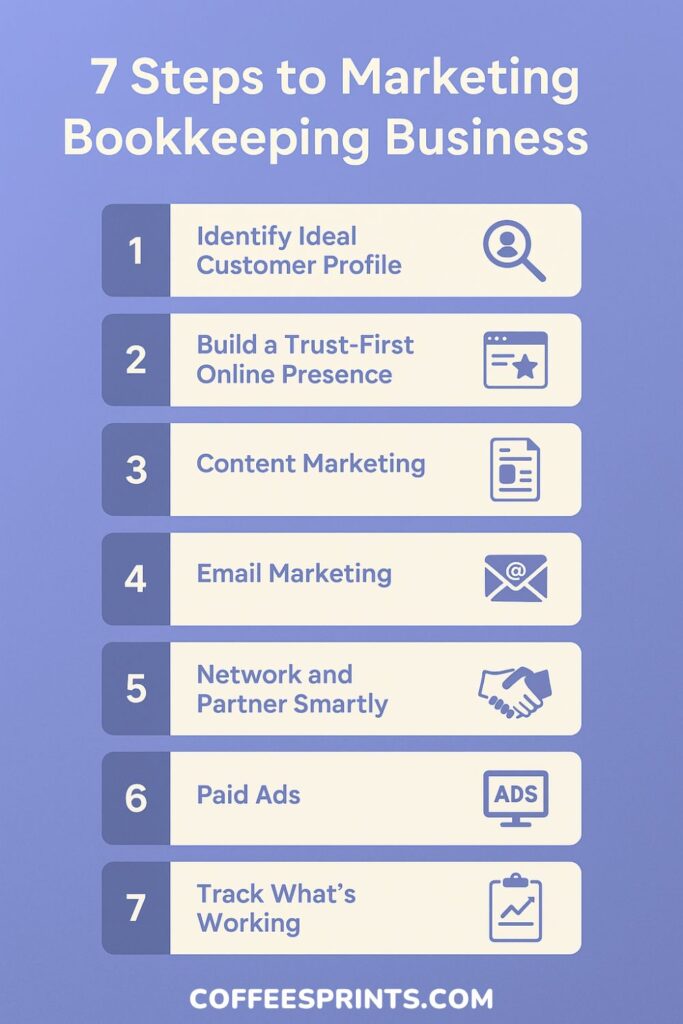How to Market Your Bookkeeping Business: 7 Smart Steps for Busy Professionals

You already know how to balance books.
The harder part?
Getting your business in front of the right people. Most bookkeepers rely on word of mouth, but in today’s market, that’s not enough.
You don’t need to become a full-time marketer, but you do need a simple system that helps you stand out, earn trust, and bring in steady clients.
If you’re like most bookkeepers, you rely on referrals or networks. And while they are great, they’re unpredictable.
What happens if they dry up after tax season?
Or when your best client downsizes? Without a clear marketing strategy, you’re left hoping the phone rings.
In this guide, I will show you how to market your bookkeeping business in a way that fits your schedule and feels doable, without jargon. These are practical steps you can implement right away to build trust, attract the right clients, and create consistent growth.
And if you’d rather not figure it all out alone, Coffee Sprints can help with personalized audits, roadmaps, and strategies that take the stress out of marketing.
Why Marketing Matters for Bookkeepers
Bookkeeping is essential, but let’s be honest, many clients treat it like a commodity. They assume every bookkeeper does the same thing and shop on price. That’s why marketing yourself and your business is so important.
Effective marketing doesn’t mean running flashy ads or dancing on TikTok, it comes in consistency. It means showing your expertise, positioning yourself as trustworthy, and making it easy for potential clients to say “yes.”
Your potential clients and businesses don’t just want their books balanced. They want peace of mind, compliance, and time to focus on growth. So that is exactly what you want them to know–Good marketing communicates that value before you even get on a call.
7 Steps to Market Your Bookkeeping Business The Right Way

Step 1: Who is Your Audience or Ideal Customer?
One of the fastest ways to stand out as a bookkeeper is to stop trying to serve everyone. When your message is too broad, it blends into the noise. Narrowing your focus makes you memorable and helps you attract clients who actually value your work.
Freelancers and solopreneurs → emphasize tax prep and compliance.
Startups and small businesses → highlight cash-flow management and growth support.
Local service providers (like gyms, salons, consultants) → focus on monthly consistency and reducing tax stress.
Take 10 minutes and write down your top three client profiles.
Here are some questions you want to answer:
- What industries are they in?
- What are their biggest financial headaches?
Once you know this, your marketing becomes sharper.
At Coffee Sprints, our Content Marketing Audit helps businesses like yours nail down their ICP and messaging so you’re not wasting time shouting into the void.
Step 2: Build a Trust-First Online Presence
Before anyone hires you, they’ll Google you. What shows up?
Your website should clearly explain who you help, what you do, and how to get started. Add testimonials, service packages, and a big “Book a Call” button.
Google Business Profile is a must. Claim it, update your details, and encourage happy clients to leave reviews.
LinkedIn matters if you’re targeting other businesses. An optimized profile adds instant credibility.
Here’s a quick win: Ask a friend or family to figure out what you offer in 10 seconds or less. If not, it’s time to rework your website messaging.
Step 3: Content Marketing for Bookkeepers
Content marketing is one of the most important steps if you want new clients to come in consistently. Ideally, you’ll want to build a simple system, sometimes called a content pipeline, so fresh leads keep finding you even when you’re busy with client work. Don’t worry, that’s an advanced tactic, and you don’t need to set it all up at once.
The key is this: content isn’t about writing whatever comes to mind. It’s about answering the questions your ideal clients already have and showing them you understand their challenges.
Here are four content types that work particularly well for bookkeepers: Content isn’t about writing what comes to your mind. It’s about showing you know your stuff and giving potential clients a reason to trust you.
- Blogs and Articles
- Answer client questions: “What’s deductible if you’re self-employed?” or “How to prep your books before tax season.”
- Share practical tips: “5 Bookkeeping Mistakes Small Businesses Make.”
- Write about deadlines: “Upcoming Tax Dates Every Freelancer Should Know.”
- Answer client questions: “What’s deductible if you’re self-employed?” or “How to prep your books before tax season.”
- Visuals and Infographics
- Perfect for Pinterest. Example: “Checklist: 7 Things to Do Before Filing Taxes.”
- Perfect for Pinterest. Example: “Checklist: 7 Things to Do Before Filing Taxes.”
- Case Studies
- Share anonymized or client stories: “How I helped a local café cut expenses and improve cash flow.”
- Share anonymized or client stories: “How I helped a local café cut expenses and improve cash flow.”
- FAQs and Guides
- Create a resource hub on your website. It shows expertise and improves SEO.
- Create a resource hub on your website. It shows expertise and improves SEO.
Action item for you: Write down five questions clients ask you most often. Each one is a blog post, a LinkedIn update, or even a quick Instagram reel.
If you’re tired of guessing what to post, our Content Strategy Roadmap builds you a 90-day content plan with topics tailored to your audience.
Alternate Read: Lead Magnet Ideas for Coaches and Small Business Owners
Step 4: Stay Top of Mind with Email Marketing
Bookkeeping isn’t a one-time service. You want clients who come back every month, year after year. Email is how you stay in their inbox — and their memory.
- Monthly newsletters: share quick updates, deadlines, or reminders.
- Lead magnets: create simple downloads like “Tax Prep Checklist” or “Top 10 Bookkeeping Mistakes to Avoid.” You can add these to your website/blog.
- Follow-ups: keep nurturing prospects who aren’t ready today but might be next quarter.
Action: Add an email signup to your website and connect it to one free resource. Even a list of 50–100 subscribers can bring in real clients.
Alternate Read: 9 Best CRMs for Solopreneurs and Small Business Owners
Step 5: Network and Partner Smartly
Most bookkeepers I know get their first clients from referrals. You can make this more streamlined so they stay consistent:
- Partner with accountants, tax advisors, and consultants.
- Join local chambers, co-working groups, or industry associations.
- Incentivize referrals: “Refer a client and get one month at 20% off.”
One good partnership can lead to consistent leads. Don’t underestimate the power of simply showing up where your clients hang out.
Step 6: Paid Marketing (If Budget Allows)
Once your website and content are in place, you can test ads:
- Google Ads: target “bookkeeping services near me.”
LinkedIn Ads: focus on small business owners or founders in your area. - Facebook Ads: retarget people who have already visited your site.
Start small. $100–$300 per month is enough to test. Track leads closely so you’re not wasting money.

Step 7: Track What’s Working
How do you know when an action/strategy is working or not? By measuring it.
Otherwise, you’re just throwing spaghetti at the wall.
- Use Google Analytics to see how people find you.
- Track lead sources: referrals, ads, content, or email.
- Set a simple KPI: “5 consultations booked per month.”
Regular check-ins let you cut what’s not working and double down on what is.
Bonus: Build Extra Trust
Bookkeeping is built on trust. A few extra touches can tip the scales:
- Testimonials & Reviews: Ask clients for short quotes and display them prominently.
- Video Reviews: A 30-second clip feels more authentic than text.
- Workshops & Webinars: Topics like “Bookkeeping Basics for Freelancers” position you as an expert and create leads.
Conclusion
Marketing your bookkeeping business doesn’t require a huge budget or complicated tactics. It requires clarity, consistency, and trust. Define your niche, build a professional online presence, share helpful content, and stay in touch via email and networking.
And if you’d like to market your business without the overwhelm, Coffee Sprints is here to help. From marketing roadmap to driving leads and refining messaging to prospects, we handle everything for you.
Ready to market your bookkeeping business with confidence? Start with a Content Marketing Audit.






